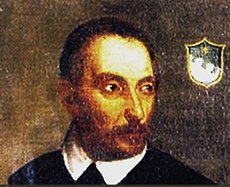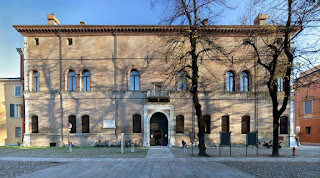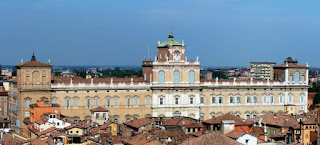Late Renaissance church musician wrote madrigal comedies to entertain audiences
Orazio Vecchi, who is regarded as a pioneer of dramatic music because of his innovative madrigal comedies, died on this day in 1605 in the city of Modena, in the Emilia-Romagna region.
Vecchi mixed sacred music with
pieces written for entertainment
His most famous composition, L’Amfiparnaso, was always intended as music for entertainment. It was a set of 15 pieces that were dramatic in nature, although they were not meant for the stage.
Vecchi is known to have been baptised in December 1550 in Modena. He was educated at a Benedictine monastery and took holy orders.
He knew composers of the Venetian school, such as Giovanni Gabrieli, and he composed himself in the form of sacred music, such as masses and motets, as well as canzonette and madrigals for entertainment.
Vecchi served as maestro di cappella at the cathedral of Salò and as choirmaster at the cathedral of Reggio Emilia. He then became a canon at Correggio, where he was able to compose prolific amounts of music during his time there, before moving back to Modena, where he served as a priest and also had charge of the choir.
 |
| A woodcut of an actor delivering the prologue of Orazio Vecchi's L'Amfiparnaso in Venice in 1597 |
Duke Cesare d’Este appointed Vecchi his maestro di corte at the ducal court in Modena in 1598. The composer was put in charge of music at the court as well as the musical education of the Duke’s children. He accompanied the Duke to Rome and Florence in 1600 and while they were in Florence, Vecchi heard Jacopo Peri’s opera, Euridice. Vecchi died in Modena in 1605.
Vecchi has become renowned for his idea of grouping madrigals together in a new form called the madrigal comedy. This was light, popular, dramatic entertainment, which some regard as one of the precursors to opera. It included music of many types and even used burlesque and dramatic dialogue. There was no scenery and the audience would have been friends of the singers, so it cannot be considered as an early form of opera.
However, the sense of drama and contrast displayed in Vecchi’s work has caused experts to say that he led the way with dramatic music, even though they believe L’Amfiparnaso stands apart from the path that opera was to eventually take.
Travel tip:
The Palazzo dei Principi in Corregio, which is
today home to a museum of archaeology and art
Correggio, where Orazio Vecchi served as a canon and wrote much of his music, is a town in the Emilia-Romagna region. The Renaissance painter Antonio Allegri, who was known as Il Correggio, was born there in 1489. One of the main sights in Correggio is the elegant Palazzo dei Principi in Corso Cavour. In 1659 Correggio was annexed to the Duchy of Modena. The present Duke of Modena, Prince Lorenz of Belgium, Archduke of Austria-Este, is the current holder of the title of Prince of Correggio.
Travel tip:
The Ducal Palace in Modena, which was built
for Francesco I d'Este in the 17th century
Modena, where Orazio Vecchi was born and died, is a city on the south side of the Po Valley in Emilia-Romagna. It is known for its car industry, as Ferrari, De Tomaso, Lamborghini, Pagani and Maserati have all been located there. The city is also well known for producing balsamic vinegar. Operatic tenor Luciano Pavarotti and soprano Mirella Freni were both born in Modena. One of the main sights in the city is the huge, baroque Ducal Palace, which was begun by Francesco I on the site of a former castle in 1635, after Vecchi’s death. His architect, Luigi Bartolomeo Avanzini, created a home for him that few European princes could match at the time. The palace is now home to the Italian national military academy.
Also on this day:
1461: The birth of cardinal and art collector Domenico Grimani
1743: The birth of cellist Luigi Boccherini
1953: The birth of actor and director Massimo Troisi
1977: The birth of operatic tenor Vittorio Grigolo
No comments:
Post a Comment